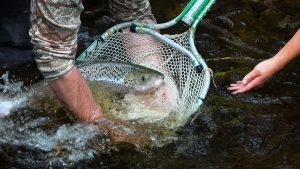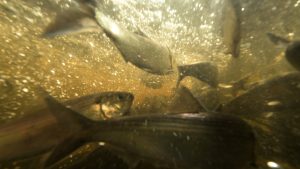For decades, the Passamaquoddy Tribe at Sipayik has been living with a drinking water crisis. High sediment content at the increasingly shallow Boyden’s Lake, the Tribe’s current water source, requires high chlorine processing at the municipal water district. This creates trihalomethanes (THM), linked to increased cancer risk and liver and kidney problems. With boil-water and health advisories regularly sent to their homes, Tribal members fill jugs from a pump at a church ten miles away near Robbinston, receive donation deliveries, or buy bottled water for drinking, cooking and other everyday uses.
Resolutions sought by Tribal members have been stumbled at the state and municipal level, not the least by application of the long controversial 1980 Maine Indian Claims Settlement Act. While short and medium term solutions are being pursued, including the costly upgrade of municipal water treatment filters, it is the location of a new drinking water source that is necessary for a long term solution. Recently, the Passamaquoddy attempted to use their so- called Tribal “fee lands,” located within nearby Perry, as a possible new well source. The town, however, was able to block this measure through the Settlement Act, which allows municipalities to prohibit activities occurring on Tribally-acquired fee lands. If Tribal land were able to be designated “trust land,” the Passamaquoddy Tribe would have the capability to source water there. Because of the current configuration of the Settlement Act, it is much more difficult and expensive for the Tribes within Maine to convert their fee land to trust land than it is for other federally recognized Tribes.
Two bills currently being considered by the Maine Legislature seek to reform parts of the Settlement Act– LD 906 “An Act To Provide Passamaquoddy Tribal Members Access to Clean Drinking Water,” sponsored by Passamaquoddy Tribal Representative Rena Newell and LD 1626 : “An Act Implementing the Recommendations of the Task Force on Changes to the Maine Indian Claims Settlement Implementing Act.”
Another component of LD 906, would be to relieve the municipal water district from being the only one required to pay property taxes in the State of Maine, freeing funds for filter upgrades and maintenance. The legislation would state affirmatively and explicitly that the Passamaquoddy Tribe would have the authority to regulate its environment under the Safe Drinking Water Act.
LD 906 “An Act To Provide Passamaquoddy Tribal Members Access to Clean Drinking Water,” will have a public hearing before the Legislature’s Committee on Judiciary on Thursday, February 17, 2022, at 9am.
Earlier that week, LD 1626 “An Act to Implement the Recommendations of the Task Force on Changes to the Maine Indian Claims Settlement Implementing Act,” will have a public hearing before the Legislature’s Committee on Judiciary, Tuesday, February 15, 2022, at 9am.
LD 1626 outlines 22 long negotiated Task Force recommendations including changes for fee to trust land acquisition, use of land and natural resources, hunting and fishing, taxation, criminal jurisdiction, civil jurisdiction, and the applicability of federal laws to the Tribes in Maine.
“In Sipayik we have unsanitary water, a blood line contaminated with many different levels of carcinogens. That’s right, carcinogens, filled with substances capable of causing cancer in living tissue. Our sacred water has been tested, probed and analyzed by professionals and scientists to find out why we continue to have unclean, hazardous, deadly water.” — Holly Cleaves — Sipayik Passamaquoddy Tribal Member, Sipayik School Board member, former Sipayik Tribal Council member, US Army Veteran







